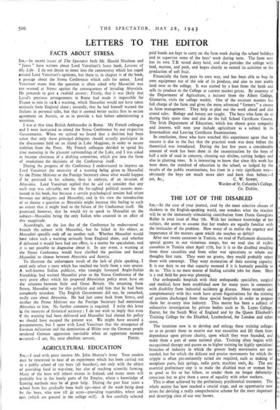FACTS ABOUT STRESA
LETTERS TO THE EDITOR Sta,—In recent issues of The Spectator both Mr. Harold Nicolson and " Janus " have written about Lord Vansittart's latest book, Lessons of My Life. .1 do not desire to enter into the controversy which has raged around Lord Vansittart's opinions, but there is, in chapter iv of the book, a passage about the Stress Conference which calls for notice.. Lord Vansittart states that the question is often asked why Mussolini was not warned at Stress against the consequences of invading Abyssinia. He proceeds to give a twofold answer: Firstly, that it was likely that Laval's previous arrangements in Rome had made it impossible for France to join in stn h a warning, which Mussolini would not have taken seriously from England alone ; secondly, that he had himself warned the Italians in personal talks, but that it seemed better tactics first to secure agreement on Austria, so as to provide a bait before administering a monition.
I was at that time British Ambassador in Rome. My French colleague and I were instructed to attend the Stresa Conference by our respective Governments. When we arrived we found that a decision had been taken that only three principal delegates should actually participate in the discussions held on an island in Lake Maggiore, in order to secure isolation from the Press. My French colleague decided to spend his time motoring in the p!easant surroundings of the Lake, and I was asked to become chairman of a drafting committee, which put into the form of resolutions the decisions of the Conference itself.
During the progress of the Conference I endeavoured to impress on Lord Vansittart the necessity of a warning being given to Mussolini by the Prime Minister or the Foreign Secretary about what would happen if he persisted in his scheme, then in embryo, of an invasion of Abyssinia. Lord Vansittart replied that he uid t.ot consider that any such step was advisable, not for the far-sighted political reasons men- tioned in his book, but because a certain psychological tension had arisen between our delegates and Mussolini, and in his view the introduction of so thorny a question as Abyssinia might increase this feeling to such an extent that it might lead to the failure of the Conference itself. He promised, however, that he would try to speak to Mussolini on the subject—Mussolini being the only Italian who counted in an affair of this magnitude.
Accordingly, on the last day of the Conference he endeavoured to broach the subject with Mussolini, but he failed in his object, as Mussolini speedily rode off on another tack. Whether Mussolini would have taken such a warning seriously from England alone, and whether if delivered it would have had any effect, is a matter for speculation, and it is not possible to dogmatise about it. In any event, a warning at the Stress Conference would have clarified the position and forced .Mussolini to choose between Abyssinia and Austria.
To illustrate the unfortunate result of the lack of plain speaking, I need only relate a story which has reached me lately from a sure source. A well-known Italian publicist, who strongly favoured Anglo-Italian friendship, had warned Mussolini prior to the Stresa Conference of the very grave effect which his proposed Abyssinian policy must have on the relations between Italy and Great Britain. On returning from Stress, Mussolini sent for this publicist and told him that he had been completely mistaken. The English Government did not, he remarked, really care about Abyssinia. He had just come back from Stresa,_and neither the Prime Minister nor the Foreign Secretary had mentioned Abyssinia to him. No further comment is required. I write this letter in the interests of historical accuracy ; I do not wish to imply that even if the warning had been delivered and Mussolini had altered his policy we should have escaped the present war. We might have secured a postponement, but I agree with Lord Vansittart that the resurgence of German militarism and the domination of Hitler over the German people rendered German aggression inevitable when an opportune moment
occurred.—I am, Sir, your obedient servant, PERTH.


























 Previous page
Previous page